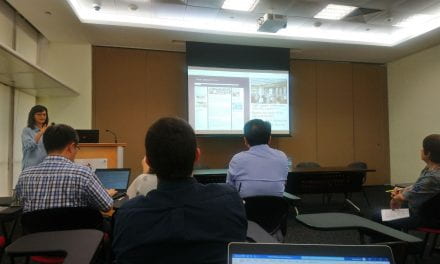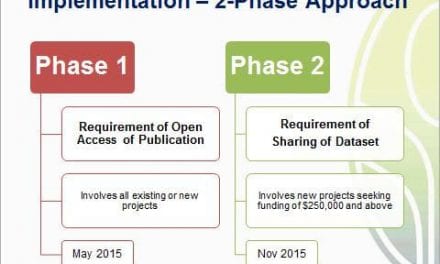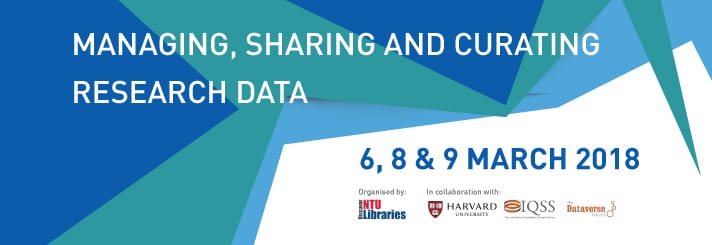The webinar on Open Data Sharing, held during the International Open Access Week, was part of a Webinar Series which featured local and international scholars sharing their knowledge and insights on various topics related to Open Scholarship. The Open Data Sharing webinar seeks to inform the research community regarding motivations, challenges and best practices of data sharing.
By a fortuitous turn of events, this year’s webinar on Open Data Sharing coincided with the COVID-19 pandemic, which has put a spotlight on data availability like never before (1, 2, 3). The recognition that more open data sharing can lead to faster advances and treatments has led to an unprecedented worldwide effort to openly share publications and data related to COVID-19. This is exemplified by the wealth of datasets in COVID-19 Data Collection at Harvard Dataverse (see previous blog “COVID-19 Research Data“).
For the first talk on “COVID-19 Statistics in China”, we were honoured to have Assoc Prof Cheong Siew Ann and Dr Liu Wenyuan from the School of Physical and Mathematical Sciences at NTU to speak about publishing their research data. They started with the reasons behind building their own dataset, citing a lack of suitable open datasets. Then, they proceeded to show their deposited dataset at GitHub as well as at the institutional repository DR-NTU (Data). They fielded several questions on data extraction and validation, and talked about the platforms they used to share their dataset. Notably, the DataCite DOI minting and Data Citation functionalities in DR-NTU (Data) are of importance to researchers. Persistent IDs such as DataCite DOI facilitate the indexing, discoverability and reliable long-term access of a dataset at various platforms, e.g. Google Dataset Search and Data Citation Index in Web of Science. This would also allow other researchers to cite the dataset in their research outputs with ease and confidence in its long-term access.
Presentation slides by Assoc Prof Cheong Siew Ann and Dr Liu Wenyuan
 Loading...
Loading...
For the second talk on “Data Sharing in Psychology”, Dr Pierina Cheung spoke about the different factors that influence data sharing (e.g. journals’ and funders’ requirements, reproducibility crisis), and benefits to researchers citing recent literature (4, 5). She used an example of a collaborative open database, Wordbank, to illustrate how such a data archival/sharing site can facilitate exploration and future research. Lastly, she talked about her own experiences in making developmental data available in Open Science Framework (OSF) and NIE Data Repository, as well as the different approaches to overcome data sharing challenges.
Presentation slides by Dr Pierina Cheung
 Loading...
Loading...
We had a great turnout for the webinar this year. About 100 participants attended, some of whom were from academic institutions from other parts of the world. Many showed a keen interest in tackling obstacles in data sharing. This was evident from the active exchanges between participants, speakers and organisers in the Chat on various topics ranging from data validation, data ownership and data sharing licenses. Several raised concerns about ethical considerations for data sharing involving human subjects, to which Dr Cheung elaborated on informed consent for data sharing, anonymisation, and sharing what you can (e.g. methods, analyses).
Lastly, the session concluded with a lively and informative presentation by librarians Dr Sun Guangyuan and Mr Wong Yong Yeow, who shared about the institutional research data repositories for NTU and NIE, i.e. DR-NTU (Data) and NIE Data Repository, respectively.
Presentation slides by Dr Sun Guangyuan and Mr Wong Yong Yeow
 Loading...
Loading...
As organisers, we are certainly heartened by the lively and enthusiatic participation during the webinar. We hope to see you all again in future research data events organised by the NTU Library!
Comments? Questions? Suggestions? Let us know!
References:
- Kelly Servick and Martin Enserink. The pandemic’s first major research scandal erupts. 5 Jun 2020. Science 368 (6495). pp. 1041-1042. https://doi.org/10.1126/science.368.6495.1041
- Mikael Hartman and Lee Chuen Neng For The Straits Times. Spotlight on trust in science of Covid-19. 13 Jun 2020. https://www.straitstimes.com/singapore/spotlight-on-trust-in-science-of-covid-19
- Reuters For Channel News Asia. Show me the data: US doctors sceptical of reported COVID-19 breakthrough. 17 Jun 2020. https://www.channelnewsasia.com/news/world/us-doctors-sceptical-of-reported-covid-19-dexamethasone-12842860
- Christensen G, Dafoe A, Miguel E, Moore DA, Rose AK (2019) A study of the impact of data sharing on article citations using journal policies as a natural experiment. PLOS ONE 14(12): e0225883. https://doi.org/10.1371/journal.pone.0225883
- Piwowar HA, Day RS, Fridsma DB (2007) Sharing Detailed Research Data Is Associated with Increased Citation Rate. PLOS ONE 2(3): e308. https://doi.org/10.1371/journal.pone.0000308





